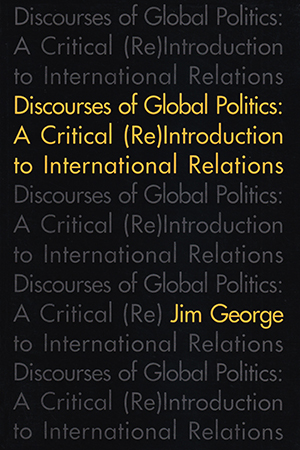An unusual combination of synthesis and original scholarship, this new text considers the contemporary agenda of international relations within a broad historical-philosophical context.
George first deals explicitly with precisely how, and with what effect, the dominant post-World War II approaches to international relations are located in this larger context. He then concentrates on the application of these approaches in the theory and practice of the IR community. Going beyond the conventional accounts of, for example, the "Americanization" of the discipline and its development via a "great debates" scenario, he suggests an alternative way of reading and understanding international relations.
The book offers at least three new dimensions to the available IR literature: George takes seriously the question of how we understand ourselves and our world, adding to the IR agenda a comprehensive discussion of the way we "know," and the way we apply that knowledge (e.g., via policy decisions). Though he brings a critical focus and tone to this discussion, he investigates the dominant disciplinary perspectives in their own terms. And not least, he explores some of the most significant of the critical perspectives that have been at the forefront of the challenge to traditional and disciplinary orthodoxies.
Jim George taught international relations at the Australian National University for twenty-five years before his retirement in 2012.
North and South America, Japan, and Australia/New Zealand only."An indispensable introduction to the (often obscure) writings of various brands of 'critical theory'."—NOD & Conversion
"A most interesting book which sets out a clear exposition of the limitations of orthodox IR, and of the need for it to be reconnected to the broader flow of contemporary 'theoretical' inquiry."—Australia and World Affairs
"George's careful reading of modernistic philosophic traditions introduces the critical potentials found within each and offers a reinterpretation of their positivist framing.... An especially noteworthy feature of Discourses of Global Politics is its comparative discussion of differences and commonalities among conventional, critical, and postmodernist writers.... Discourses of Global Politics is a text that presents complex "foreign" themes and postmodern musing to the interested reader in an accessible as well as rich and complex form."—Mershon International Studies Review
"Offers ... an argument with the potential to contribute to a much needed refocusing of international relations theory .... Jim George has staked out a position in the disciplinary debate which will not be easily disregarded"—ANU Reporter
"A lucid and useful guide to the critical theories of international relations which have appeared over the last ten years. . . .ought to be widely-used in courses and frequently-cited in future debates."—Australian Journal of Political Science
"An impressive survey that will find use as an alternative text in advanced theory courses."—Canadian Journal of Political Science
"This is a very good and important book.... One that deserves to attract a wide readership among students and scholars of 'International Relations'—both the old discipline and the new."—International Affairs
"The new Lynne Rienner series 'Critical Perspectives on World Politics' is proving to be a valuable source of post-positivist international relations theory."—Millenium
"An excellent introduction to the growing critical and post-modern literatue in the field. It is an excellent textbook with an argument.... Well-written and provocative."—Australian Journal of International Affairs
"A very sophisticated discussion of the various links between the theory and practice of IR.... Useful for both theoreticians as well as more 'fact' oriented practitioners.... Accessible enough to serve as a highly unusual and long overdue alternative introductory text to the study of global politics."—Pacific Research International Journal
"An important contribution to the ongoing debate on international relations theory."—Harvard International Review
"Sure to be the alternative text for international relations courses. . . . I can think of no other book that provides as comprehensive a tour of the presuppositions that guide both the mainstream's and the critics approaches to interpreting international politics."—David Campbell
"A very important contribution and an excellent teaching tool. . . . George provides a comprehensive treatment of the philosophical bases of both traditional and critical work in IR."—Michael J. Shapiro






